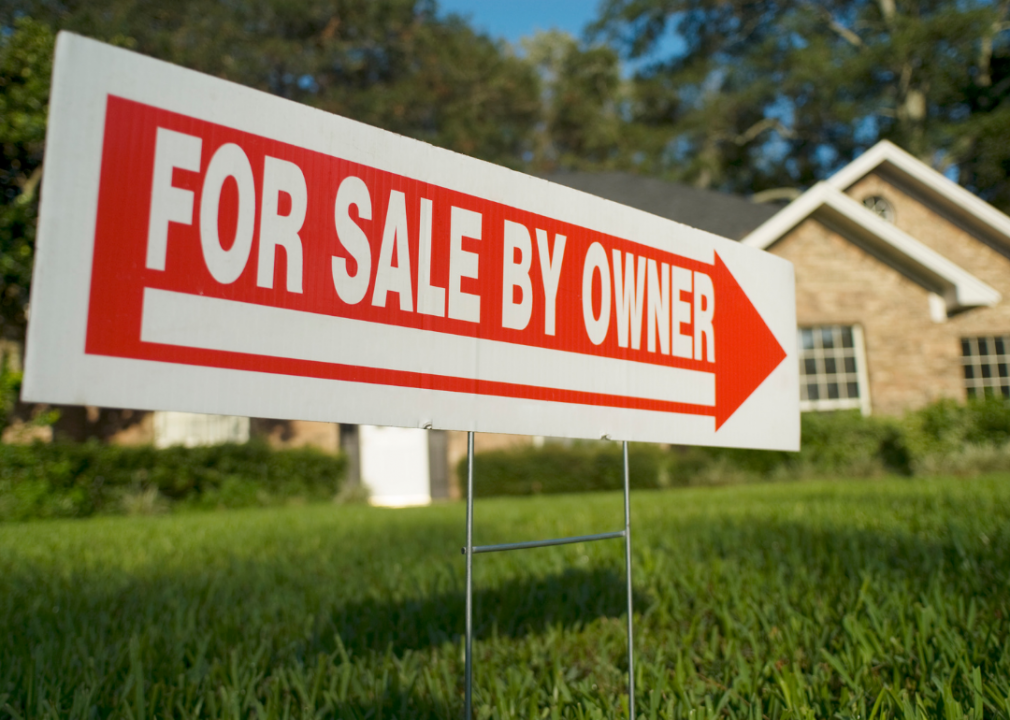10 things to consider when selling a home by yourself
Published 2:30 pm Wednesday, October 27, 2021
Andy Dean Photography // Shutterstock
10 things to consider when selling a home by yourself
Home prices have skyrocketed since 2020 thanks to younger homeowners entering the market, more employees working from home, and record-low mortgage rates.
This increase in home value has led many homeowners to sell—but not all of them want to use a real estate agent. Whether it’s the cost savings that comes from listing without a realtor or the ease of marketing your own home thanks to online listing sites and other online real estate resources, for-sale-by-owner (FSBO) listings may be a viable option for some homeowners.
Before preparing to sell your own home, take some time to think things through and do a bit of research. To help, using various online real estate and financial sites, UpNest compiled a list of 10 things you may want to consider if you are selling a home by yourself.
Just 8% of home sales in 2020 were FSBO listings, according to the National Association of Realtors (NAR) Profile of Home Buyers survey from that year. Part of the reason for the low percentage is that FSBO listings can be difficult to navigate. They require a significant amount of time and effort between coordinating showings, determining a market-correct listing price, and accessing marketing opportunities on the Multiple Listing Service (MLS) in your area. NAR also found that the two most difficult tasks in FSBO listings, according to respondents, were preparing and fixing up the home to sell and understanding and performing paperwork.
Keep reading to determine whether an FSBO listing is the right choice for you and for tips on getting your home from listed to sold.
![]()
Canva
Weigh the pros and cons of FSBO and agent listings
Agents bring years of expertise and knowledge to help price your home, navigate paperwork and negotiations, market your home, and set up open houses and showings. But they also come with a hefty price tag: The average agent’s commission of 5% to 6%, which can add up to tens of thousands of dollars. Ultimately what you save in money though, you may put back in with time and effort depending on how quickly your home sells and how knowledgeable you are about money, home sales, and marketing. You will effectively be taking over all the responsibilities of an agent.
FSBO listings offer owners more control—but some sellers may struggle with honest feedback from buyers and their agents. Also, in some cases, sales are slower on FSBO versus agent-listed properties. The NAR found the median income of agent listings to be significantly higher than that of FSBO listings.
Canva
Determine an appropriate selling price
To settle on an appropriate and fair market value for your home, it’s important to put personal feelings aside and take an honest and unbiased look at the home’s strengths and weaknesses. Real estate sites often offer quick home valuations, though a home appraisal by a professional offers a higher level of detail and accuracy.
Price is a consideration, and a single-family home appraisal can run anywhere from $300 to $500, according to Bankrate, though many factors from location to home size can impact appraisal pricing. Research what is selling in your area, how other homes’ selling points compare to yours, and the pricing of comparable homes. This will give you a sense of the housing market is in your area and help you set an appropriate price point. Pricing too high may leave your home sitting on the market; but if priced too low, you risk losing money on the sale.
Even if you’re selling on your own, you can always reach out to an agent if you get stuck on pricing and need an expert opinion.
wavebreakmedia // Shutterstock
Prepare your home to sell
To prepare your home for potential buyers, it’s important to stage it so people can imagine themselves living there.
Remove personal items and make the home as neutral and uncluttered as possible. Clear out basements and attics, and hire a professional cleaner and a trash removal service to ensure your home shines when it’s listed. Take care of repairs or unfinished jobs by yourself or with the help of a professional. Curb appeal is also important — mow the lawn, pull visible weeds, and pick up the kids’ toys and other yard debris.
To get the greatest return on your investment for any home projects you’re finishing up ahead of listing, look online for cost estimate calculators that can help you determine your return on investment.
Jacob Lund // Shutterstock
Figure out paperwork
When selling a home, there is a significant amount of paperwork from disclosures on your home’s condition to accepting an offer.
Depending on the state you live in, you may need to fill out a residential sales disclosure form. A simple online search can determine this. The form discloses important information about the condition of the home and any defects that may affect the home’s value. Fill it out before your home is listed.
Other forms, like the lead-based paint disclosure form, are federal requirements depending on the age of your home. There will also be a vast amount of paperwork to navigate once you accept an offer. Online searches can be an affordable way to educate yourself on what paperwork you’ll need and where to find the appropriate forms, but reach out to a real estate attorney or title company for expert advice if you get bogged down or confused.
Andrey_Popov // Shutterstock
Weigh the cost of professional photos against attracting buyers to your home
Photographs give a clear first impression of your home, making high-quality images worth every penny.
If hiring a professional photographer isn’t in the budget, take your own pictures. They should present your home in its best light: uncluttered, clean, and ready to welcome a new owner. Pair the images with descriptions that laying out all your home’s assets and amenities—whether a new roof, large backyard, or stellar location—before you get your home on the MLS.
Do not underestimate the power of online marketing, as 47% of GenXers use online sites to search for home listings according to the NAR. Share your home on all social media sites as well for maximum online exposure. One budget-friendly and old-school way to attract people to your home is to set out a for sale sign in your yard with contact information clearly listed.
Monkey Business Images // Shutterstock
Strategize for successful showings
One of the hardest things about selling a home, whether listing with as FSBO or with an agent, is having to show your home whenever a potential buyer requests to see it.
An open house allows multiple people and buyers’ agents to see your home at one time, though often additional showings are necessary. If a buyer’s agent can handle the showing, plan to be out of the house. If you are home, it may prove awkward and distracting to buyers. Keep children and pets outside of the house during showings as well.
To prepare for each showing, your home should be clean, clutter-free, and free of any pet or offensive odors. It has been proven, however, that certain odors including citrus, cinnamon, and vanilla can impact mood and emotion, and can help sell your home.
comzeal images // Shutterstock
Be prepared to negotiate
Negotiation is a major aspect of selling your home, whether it be for the cost of your home, some prime pieces of furniture, or throwing in a few select appliances to close the deal. Agents are skilled in this area and know the value of many home projects.
If the buyer wants to have a few simple repairs made or a new furnace put in before agreeing to buy the house, realtors know the cost of such repairs or know experts who do. They can navigate how to negotiate these repairs and tell you how they might impact a final selling price. You can, however, contact local experts in the area to get your own cost estimates. Closing costs are also often up for negotiations, as is the price of your home; low offers can be countered. Look online or contact a local expert from a real estate law firm, title company, or mortgage lender for a bit of advice to help you secure the best offer and final sale price.
Amnaj Khetsamtip // Shutterstock
You may still have to pay a buyer’s commission
While you will save up to 5% or 6% when you sell a home without using a seller’s agent, expect to still pay a buyer’s agent commission. These agents bring buyers in to show your home but they do not represent you—they represent the buyers and their interests.
A buyer’s agent fee can run anywhere from 2% to 3%. Sometimes a buyer does not use an agent, and while this can prove cost-effective, the buyer will have less guidance than a buyer who works with an agent. If you feel comfortable with negotiations and paperwork, this is fine. Hiring a real estate attorney is especially helpful in cases like this.
PongWatchara // Shutterstock
Be mindful of the benefits a real estate attorney can provide
Have at least one professional you can count on to represent your best interests when selling your home. Real estate attorneys can do that and answer other questions. While they are not free, most attorneys charge a flat fee or an hourly rate for their expertise, which may be worth it. They can also navigate the closing process, including negotiations and lengthy and verbose paperwork.
Some states such as Georgia and New York require all sales to be overseen by real estate lawyers. To find a reputable attorney, conduct an online search or ask a friend or family member for a referral.
Monkey Business Images // Shutterstock
You can always hire an agent
Whether it’s taking too long to sell or the paperwork is overwhelming, it is okay to bring on an agent during the process. Saving money is important but may not equate to the savings you anticipated once you factor in your own time. Agents bring a wealth of expertise with them and often have access to resources and potential buyers that you may not.
Agents’ commissions have also seen a drop. The average real estate commission was down to less than 5% for 2020, according to a survey by Colorado-based research firm Real Trends.
This story originally appeared on UpNest
and was produced and distributed in partnership with Stacker Studio.
















